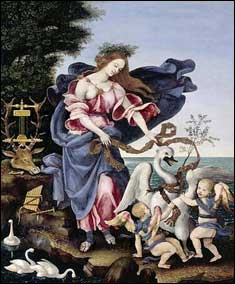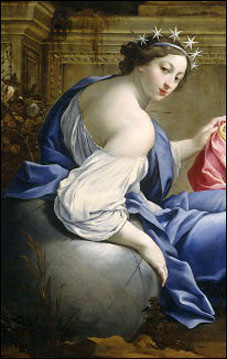 We begin with Calliope, Muse of Eloquence and heroic Poetry. Her name means fine voice and she is depicted with stylus and tablets.
We begin with Calliope, Muse of Eloquence and heroic Poetry. Her name means fine voice and she is depicted with stylus and tablets. (Simon Vouet, French, 1590 - 1649detail of Calliope fromThe Muses Urania and Calliope, c. 1634, oil on panel, Samuel H. Kress Collection)
Carolyn of Guilt-Free Homeschooling answers questions from a first time homeschooler embarking on this heroic endeavor. In another epic adventure, Anne of PalmTree Pundit writes about the silver lining during discouraging times. Tenniel for SCHOOL@HOME blogs about risk taking and learning to fly. Homeschool Mami explains how speaking two languages at home gives her children great eloquence.
 Clio the "Proclaimer" is the muse of history and is often seen sitting with a scroll and accompanied by a chest of books.
Clio the "Proclaimer" is the muse of history and is often seen sitting with a scroll and accompanied by a chest of books. Clio, the Muse of HistoryDetail from 'The Allegory of Painting' by Vermeer Kunsthistorisches Museum, Vienna
Steve at the Dad's Corner reveals a little history about American coins the he learned from a tour at the Denver Mint. Janine at Why Homeschool shares why the history that we have with our family matters so much.
 Erato the "Lovely" is the muse of love poetry and mimicry. She is seen with a lyre and sometimes wears a crown of roses.
Erato the "Lovely" is the muse of love poetry and mimicry. She is seen with a lyre and sometimes wears a crown of roses. (By Filippino Lippi. Allegory of Music (The Muse Erato). 1504. Tempera on panel. Gemaldegalerie, Berlin, Germany.)
Mimicry can be a good thing. Beverly at About Homeschooling shares printable pages and a photo gallery to help homeschoolers learn about Maple Sugaring. Queen of Carrots of Introducing the World shares fun activities with pictures. And moving on to poetry, Bruggie Tales shares a poem "I Stitch, you stitch, we all stitch." Sweetness and Light gives us a list of the reasons she loves to homeschool.
 Euterpe is the muse of music. Her name means "rejoicing well" or "delight".
Euterpe is the muse of music. Her name means "rejoicing well" or "delight". Laurent de la Hyre : La Muse Euterpe, 1648 painted by painted by Camiile Roqueplan.
Mrs. Happy Housewife describes how folk songs are a favorite part of their homeschooling.
 Melpomene is the muse of tragedy. In spite of her joyous singing, she is represented by the tragic mask.
Melpomene is the muse of tragedy. In spite of her joyous singing, she is represented by the tragic mask.Elisabetta Sirani (Italian, 1638-1665) Melpomene, The Muse of Tragedyn.d.Oil on canvas, 34 1/4 x 28 in.
Steve Braun, husband of Spunky, debates what he regards as a tragedy in the Christian homeschooling community, the endorsement of Robert Kiyosaki's Rich Dad Poor Dad. Captain Mom discusses the tragedy of pushing academics too early and the harm of expecting all children to develop at the same rate. Trivium Pursuit details the tragedy of socialization at public school.
 Polyhymnia (Polymnia), "She of Many Hymns," is the muse of Sacred Poetry. She brings distinction to writers whose works have won them immortal fame. She has also been called the Muse of geometry, mime, meditation and agriculture.
Polyhymnia (Polymnia), "She of Many Hymns," is the muse of Sacred Poetry. She brings distinction to writers whose works have won them immortal fame. She has also been called the Muse of geometry, mime, meditation and agriculture. K20.10 "The Nine Muses"Roman Mosaic, Vichten C3rd ADLuxembourg City, NationalMuseum of History and Art
Spunky at SpunkyHomeSchool shares her own sacred poetry, The Ten Commandments for Christian Homeschooling Moms. Amy at DANDELION SEEDS explains the principle of PUSH (Pray Until Something Happens).
 Terpsichore the "Whirler" is the muse of dancing and is often seen dancing with her lyre and a plectrum, an instrument used for plucking stringed instruments.
Terpsichore the "Whirler" is the muse of dancing and is often seen dancing with her lyre and a plectrum, an instrument used for plucking stringed instruments. Eustache Le Sueur - The Muse Terpsichore (1652-55), Oil on panel, 116 x 74 cmMusée du Louvre, Paris
I'm sure many homeschoolers can relate to that "whirler" feeling. Christine at The Thinking Mother explains that delicate dance with do when networking with other homeschoolers. Melissa at Home Sweet Home talks about another delicate dance, how we decide how many extra-curricular activities is too much. Twice Bloomed Wisteria takes on the difficult question: How much is enough?
 Thalia (Thaleia) the "Flourishing" is the muse of comedy and of playful and idyllic poetry, and is often seen with a comic mask.
Thalia (Thaleia) the "Flourishing" is the muse of comedy and of playful and idyllic poetry, and is often seen with a comic mask. Seated muse, Thalia (Roman, 2nd century A.D. - Hadrianic period)
Dr. Helen comments on an article in the Washington Post with reference to replacing the Gifted program in Montgomery County, Maryland. We weren't sure whether to put this under comedy or tragedy. Patricia at Pollywog Creek Porch shares how Grandma's comments while studying Shakespeare sometimes made her smile. One Sixteenth contemplates mummifying a chicken as they study ancient Egypt.
 Urania the "Heavenly" is the muse of astronomy and is represented by a staff pointed at a celestial globe.
Urania the "Heavenly" is the muse of astronomy and is represented by a staff pointed at a celestial globe. Simon Vouet, French, 1590 - 1649detail of Calliope fromThe Muses Urania and Calliope, c. 1634, oil on panel, Samuel H. Kress Collection
Dana at Principled Discovery discusses why it is important to look to a heavenly standard when we struggle with mixed motives in our homeschooling.
If you have enjoyed the Carnival of Homeschooling, please spread the word.
If you missed the previous carnivals, click here for the archives.
Next week the carnival will be held at PalmTree Pundit. If you are interested in submitting a post, click here for information.
If you have some constructive suggestions on how to improve this carnival, please leave a comment.
For those interested, the Carnival of Education will be coming out on Wednesday.
This carnival is registered at TTLB's Uber Carnival.
I'd like to thank everyone who has helped out. Thank you to all the participants in this carnival. And thanks to all those who have helped publicized the Carnival of Homeschooling.
----------
Technorati tags: homeschooling, homeschool, home school, home education, parenting, children, education, teaching, politics, books, muse, Calliope, Clio, Erato, Euterpe, Melopomene, Polyhymnia, Terpsichore, Thalia, Urania
14 comments:
The first time my husband enters any carnival and its a "tragedy" I love it. Thanks for putting it all together.
I wouldn't volunteer to host the carnival, considering how inventive the past themes have been..
It's just beautiful. I love it.
Henry you are so creative! I would not have thought of this wonderful theme. The Goddess images are lovely.
As I just blogged about I feel more like a complainer or a windbag sometimes, than a muse or an Ancient Greek Goddess.
I am going to have to think of a theme then I will offer to host a Carnival!
Thanks for all your kind words.
We've had a report of problems viewing the carnival (pictures blocking the text). If you are having this problem or any other, please email Henry at Cate3@panix.com.
Just to be clear, my wife is the creative one. I do fine with organizing, getting the submissions, and so on. This week's theme was her idea, and she put together all the stuff related to the Muses.
Beautifully done--artful and educational:-)
Y'all are so clever! Thanks for being so creative! Blessings ~ Patricia
Very clever theme! How am I supposed to follow that? ;-)
home schooling is for people who don't like going to public school becuase the kids in public schools are satanic.
Good job. Good carnival. I'll be back.
Great Carnival -- what variety! Thanks for inviting me, Henry.
"Very clever theme! How am I supposed to follow that?"
Well the Romans came after the Greeks. Maybe you could have some tie in with Roman culture, dress, history, mythology, geography ... etc.
Fabulous format! We've linked your midway over at this week's edition of The Carnival Of Education.
The Tapestry of Bronze is sponsoring a series of poetry contests to celebrate Greek and Roman mythology and the Olympian gods. The subject of the first contest is Zeus (also known as Jupiter), the King of the Gods.
Each poem may be no longer than 30 lines and each poem must be in English.
The first contest opens on February 15, 2008 and remains open until March 31, 2008. However, you can read about the rules and the prizes now by going to
http://www.tapestryofbronze.com/OdeForm.html
Hope that many of you will enter! Also, even if you're not interested in entering, feel free to share this message with those who might be interested in entering. There's a special section for those under 18, so we especially hope to encourage high school teachers to pass this out to their students.
Post a Comment